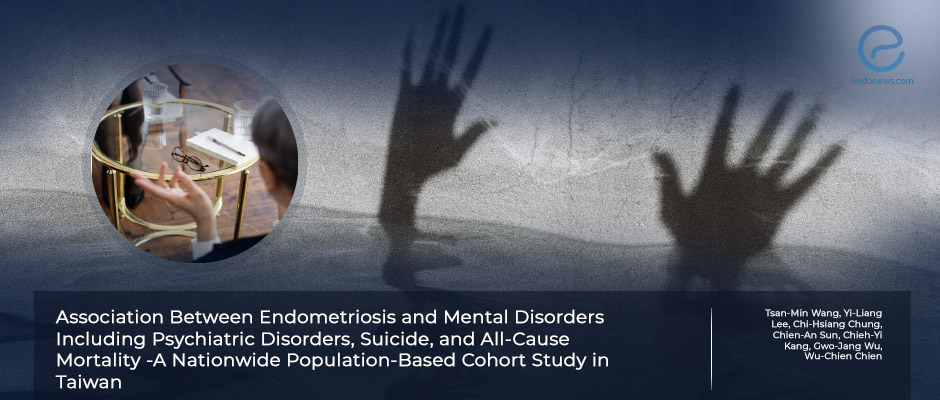Endometriosis and the risk to have mental disorders
Jan 24, 2024
Women with endometriosis may have an increased risk for mental disorders, suicide, and all-cause mortality.
Key Points
Highlights:
- Women having endometriosis are adversely affected in physical, social, and mental aspects due to the disease-associated symptoms.
Importance:
- Routine psychiatric evaluation may be recommended for patients with endometriosis to increase the quality of life.
What’s done here?
- This population-based, matched-cohort study was conducted to assess the effect of endometriosis on psychological health in these women.
- The patients with a diagnosis of any psychiatric diseases before their first visit for endometriosis were not included.
- Age groups, geographical area of residence, urbanization level of residence, and monthly income were analyzed as the covariates.
- The study group was followed from the index date until the onset of mental disorders including anxiety, depression, bipolar, sleep disorders, posttraumatic stress disorder/acute stress disorder, dementia, eating disorders, substance-related disorders, psychotic disorders, autism, suicide, and all-cause mortality.
Key results:
- A total of 20,154 endometriosis patients and 80,616 healthy controls were included.
- There was a significant difference in terms of the development of mental disorders including psychiatric disorders and suicide between the two groups.
- A significant difference was also detected regarding the follow-up period for the diagnosis of endometriosis to mental disorders (shorter in the study group).
- Following the stratification of covariates (age, comorbidities, season of medical visits, urbanization levels, and levels of care from medical visits), the risk for the development of mental disorders in the study group was still higher.
Strengths and Limitations:
- This is the first population-based cohort study to evaluate the association between endometriosis and mental disorders, the adjustment of potential confounders increases the reliability of the analysis.
- Limitations are the lack of data on severity, the failure to analyze some confounders (genetic, environmental, diet factors, education levels), the lack of stratified analysis to compare the association between different treatment methods of endometriosis and mental disorders, etc.
Lay Summary
The most common clinical findings of endometriosis patients are pelvic pain and fertility problems, resulting in impairment of quality of life. These women are also affected regarding psychological health due to disease-associated symptoms.
Dr. Wang et al., from Taiwan, published a study titled “Association Between Endometriosis and Mental Disorders Including Psychiatric Disorders, Suicide, and All-Cause Mortality-A Nationwide Population-Based Cohort Study in Taiwan” in the International Journal of Women’s Health.
In this study, the authors aimed to evaluate whether there was any effect of endometriosis on the development of mental disorders. Anxiety, depression, bipolar, sleep disorders, posttraumatic stress disorder/acute stress disorder, dementia, eating disorders, substance-related disorders, psychotic disorders, autism, suicide, and all-cause mortality were assessed as the main outcomes.
The distribution of age, pneumonia, injury, tumor, and season of medical visits did not show a significant difference between the groups. There was a significant difference in terms of the development of mental disorders including psychiatric disorders and suicide. A significant difference was also detected between the groups regarding the follow-up period for the diagnosis of endometriosis to mental disorders, which is significantly shorter in the study group compared to the control group.
“We recommend that the Health Promotion Administration complete of scales, advocate, and form the medical policies for the physical and mental health of women.” the authors added.
Research Source: https://pubmed.ncbi.nlm.nih.gov/38046265/
endometriosis mental disorders national health insurance research database cohort study Taiwan women

